Accelerating resiliency planning in communities across the Commonwealth
Fall 2022 Resiliency Academy: Components of a Resilient Community
The Fall 2022 Resiliency Academy series focused on the Four Components of a Resilient Community. Topics include:
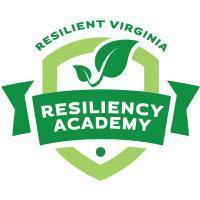
SPONSORED BY

• S E S S I O N 1 •
Economic Activities: Investing in Resilience
September 29 • 1:00–2:30 PM
Speakers
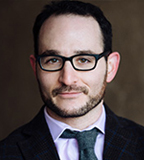
Andrew Eil
Head of Climate Risk, North America
Tata Consultancy Services
Andrew will present a brief conceptual overview of blended finance (use of catalytic capital from public or philanthropic sources to increase private sector investment in resilience projects) and examples of blended finance in the climate change resilience context in the U.S.
Andrew Eil is currently Head of Climate Risk for North America with Tata Consultancy Services (TCS), where he provides climate-related financial risk advisory services for banks, insurers, and other financial institutions. From 2018 to 2021, Andrew was a Partner at Climate Finance Advisors (CFA), a boutique advisory firm operating at the intersection of climate change policy and financial markets. With CFA and as an independent consultant from 2014 to 2018 specializing in climate change and clean energy policy, international development, and sustainable investing, Andrew served clients including the World Bank, the Green Climate Fund, UN Development Program, the Global Environment Facility (GEF), U.N. Environment, Climate-KIC, the C40 Cities Climate Leadership Group, and Bloomberg LLP.
Andrew has a masters in public affairs from Princeton (2009) and a bachelor’s degree from Harvard (2002). He is a holder of the GARP SCR (Global Association of Risk Professionals Sustainability & Climate Risk) certificate (2022), a level II candidate of the CFA (Certified Financial Analyst) (2014) and SASB Fundamentals of Sustainability Accounting (FSA) (2017), and holder of the Columbia University certificate in sustainable finance (2020).
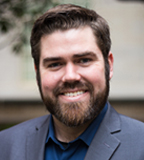
Michael Dexter
Director, Southeast Sustainable Recovery Center
Southeast Sustainability Directors Network
Michael will present on "making the case for federal funding" to provide insight on how to position your community to benefit from the recent historic level of federal investment and effectively compete for federal awards. He will cover how recent legislation, federal actions, and administration policy provide an incentive for local governments to advance climate resilience, environmental justice, and sustainability priorities.
Michael is the Director of the Southeast Sustainable Recovery Center (SSRC). The SSRC is a pilot program of the Southeast Sustainability Directors Network to help local governments and the communities they represent in the Southeast have the opportunity and support to access and be awarded funding to advance sustainability and resilience efforts. He provides technical assistance to members to access and apply for federal funding, liaises with federal agencies, and connects local governments with key partners who provide additional support under the Center’s umbrella.
Prior to being with SSDN, he worked within local, state, and federal government including at the U.S. Environmental Protection Agency to oversee a $1.2 billion annual grant program, coordinate agency-wide climate change adaptation efforts, and support disaster preparedness and emergency response efforts.
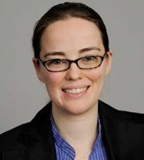
Valentina Gomez
Vice President/Senior Analyst, US Public Finance Group
Moody's
Valentina will give a brief explanation of Moody's inclusion of climate mitigation considerations as part of their local government rating criteria.
Valentina Gomez is a Vice President/Senior Analyst for the New York Local Governments Ratings Team. She is the state lead for Florida and Virginia and covers credits in North Carolina. Prior to joining Moody’s, Valentina was a Senior Budget Analyst in New York City’s Office of Management & Budget and an Analyst at Morgan Stanley. Valentina holds an MPA from New York University and a BA in Economics from Tufts University.
• S E S S I O N 2 •
Infrastructure and Buildings: Building for Resilience
October 27 • 1:00–2:30 PM
Speakers
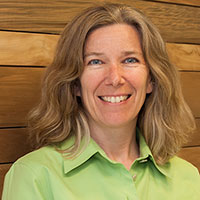
Elizabeth (Liz) Beardsley
Senior Policy Counsel
U.S. Green Building Council
Liz will speak to opportunities for resilient buildings stemming from recent Federal and Virginia legislation. Highlights will include funding coming from the Federal IIJA and IRA, as well as new requirements for municipal building projects under the Virginia High Performance Building Act for Localities.
Liz brings more than 25 years of professional experience working on environmental and climate issues both as an engineer and a lawyer. In her current role, Liz serves as Senior Policy Counsel at the U.S. Green Building Council (USGBC), a global environmental nonprofit best known for LEED, the world’s most widely used green building rating program. She provides strategic green building law and policy guidance and direction across the international, federal, state, and local spectrum, and her work focuses on connecting building policy to climate mitigation.
Liz is a sought-after expert and spokesperson for USGBC who has been interviewed by dozens of media outlets such as the LA Times, Yale Climate Connection, BBC News: Business Matters, The Aaron Harber Show, ENR, Building Green, and Commercial Property Executive. She’s also an accomplished writer whose work has been published in Governing Magazine, Green Operations, USGBC+, and others. Since joining USGBC in 2014, Liz has represented the organization at multiple United Nations COP climate change conferences. Liz currently serves on the Board of the Virginia Energy Efficiency Council (VAEEC), and previously served on the Board of the National Association of State Energy Offices (NASEO). She regularly presents at conferences. Liz appeared as a witness at hearings of the House Committee on Energy and Commerce, Subcommittee on Energy; and the House Committee on Transportation and Infrastructure, Subcommittee on Public Buildings and Emergency Management.
She has authored or co-authored policy papers such as State and Local Policy Proposal: Property Tax Incentive for GHG Reductions (2019), Perspectives on State Legislation Concerning Lead Testing in School Drinking Water (2018), and Perspectives on Implementation and Effectiveness of School Green Cleaning Laws (2015).
Liz came to USGBC from the U.S. Government Accountability Office (GAO), where she was a Senior Attorney involved in evaluating government environment and energy programs. Prior to her legal career, she was an environmental engineer and Principal at Camp Dresser and McKee (now CDM Smith), where she focused on water issues and infrastructure planning.
Liz has a B.S. in Civil Engineering from Stanford University and a J.D. from the University of Virginia School of Law.
Liz is a sought-after expert and spokesperson for USGBC who has been interviewed by dozens of media outlets such as the LA Times, Yale Climate Connection, BBC News: Business Matters, The Aaron Harber Show, ENR, Building Green, and Commercial Property Executive. She’s also an accomplished writer whose work has been published in Governing Magazine, Green Operations, USGBC+, and others. Since joining USGBC in 2014, Liz has represented the organization at multiple United Nations COP climate change conferences. Liz currently serves on the Board of the Virginia Energy Efficiency Council (VAEEC), and previously served on the Board of the National Association of State Energy Offices (NASEO). She regularly presents at conferences. Liz appeared as a witness at hearings of the House Committee on Energy and Commerce, Subcommittee on Energy; and the House Committee on Transportation and Infrastructure, Subcommittee on Public Buildings and Emergency Management.
She has authored or co-authored policy papers such as State and Local Policy Proposal: Property Tax Incentive for GHG Reductions (2019), Perspectives on State Legislation Concerning Lead Testing in School Drinking Water (2018), and Perspectives on Implementation and Effectiveness of School Green Cleaning Laws (2015).
Liz came to USGBC from the U.S. Government Accountability Office (GAO), where she was a Senior Attorney involved in evaluating government environment and energy programs. Prior to her legal career, she was an environmental engineer and Principal at Camp Dresser and McKee (now CDM Smith), where she focused on water issues and infrastructure planning.
Liz has a B.S. in Civil Engineering from Stanford University and a J.D. from the University of Virginia School of Law.
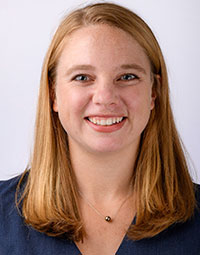
Sarah Edwards
Climate Program Analyst
DC’s Department of Energy & Environment Urban Sustainability Administration
Sarah will review the District of Columbia’s climate adaptation plan, Climate Ready DC, and its initiatives to prepare its built environment for future climate conditions, such as the resilient design guidelines that provide step-by-step strategies to incorporate resilient design into new and existing buildings. Other adaptation initiatives include a new FloodSmart Homes program, and a Blue-Green Infrastructure neighborhood strategy in Southwest DC that aim to reduce climate risks to vulnerable communities.
Sarah Edwards is a climate program analyst with DC’s Department of Energy & Environment Urban Sustainability Administration. Her work includes staffing the Commission on Climate Change & Resiliency, advancing climate adaptation and energy resilience initiatives, and incorporating climate considerations into projects and policies. Previously, Edwards worked on the flood-prepared communities team at The Pew Charitable Trusts where she established Pew’s State Resilience Planning Group, a network of state officials, each tasked with the development and implementation of comprehensive resilience plans to reduce impacts of flooding and other climate risks.
Sarah received her Juris Doctor from William & Mary Law School, where she also worked with the Virginia Coastal Policy Center, and received her bachelor’s degree from University of South Carolina.
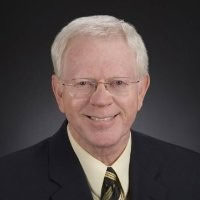
Steve Sunderman
President
Terrazia PC Architecture
This 15-minute educational session demonstrates how resilient buildings & infrastructure can be a primary strategy for mitigating impact of climate change, because it saves money, improves people’s lives and ensures a more sustainable future.
Virginia Registered Architect (#0401006818) and:
- NCARB Registered
- USGBC LEED AP/BD+
- Building Performance Institute (BPI) Analyst
- Oklahoma Certified Energy Auditor Trainer
- Certified Pervious Concrete Technician
Steve graduated from the University of Oklahoma in 1974 with both Bachelor of Architecture and Bachelor of Science in Environmental Design degrees.
His architectural career stretches over 50 years of diversified experience including extensive design, project management, energy conservation, and environmental education for a wide variety of stakeholders & building types throughout the United States and the Middle East.
Steve has promoted alternative energy, environmental conservation, and equitable facilities design since the early 1970s, and more recently extensive educational seminars related to resilient building design, sustainable design, high-performance design, and low-impact stormwater management.
“I am compelled to provide a sustainable future for my descendants and all of society by implementing a strategy of change for our built environment that saves money, improves people’s lives, and ensures a sustainable planet.”
Recent Volunteer Organizations:
- Resilient Virginia Board of Directors, 2018–Present (Chair 2019–2021)
- Cabell Brand Center Board of Directors, President: 2015–Present
- Virginia American Concrete Institute Board of Directors, 2015
- USGBC Virginia Member, 2015–Present
- Center for Green Schools National Green Schools Committee, 2011–2015
- SW Virginia Chapter: 2008–2014 Board of Directors; 2008 Vice Chair; 2009 Chair; 2010–2014 Green Schools Committee Chair
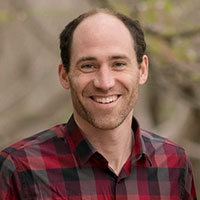
Ben Knopp
Senior Project Manager
Community Housing Partners
Ben will present a case study from Grissom Lane Apartments; a net-zero energy development in Blacksburg, Virginia. The focus will be on resilient aspects of the project, such as: passive survivability, building durability, high performance cold climate heat pumps, on-site renewable energy generation, and the unique opportunity for on-site battery storage.
Ben Knopp is a senior project manager at Community Housing Partners. He has experience in building science consulting, energy efficiency, and mechanical system research, development, design, and commissioning. His current focus includes energy equity, resiliency, health, and integrating Weatherization with decarbonization of homes in under-served communities.
Ben is a 2021 Fellow with the Clean Energy Leadership Institute, a 2019 Innovator with the Lawrence Berkeley National Lab IMPEL+ Program, a 2016 Winner of the Oak Ridge National Lab JUMP Innovation Contest in Water Heating, and holds a US patent for a novel water heating technology. Ben holds credentials such as: PHIUS+ Rater and CPHC from the Passive House Institute US, Certified Energy Manager from the Association of Energy Engineers, and Licensed Residential Building Energy Analyst from the Commonwealth of Virginia.
• S E S S I O N 3 •
Ecosystem Services: Mitigating Climate Impacts with Forests, Farms, and Fields
November 17 • 1:00–2:30 PM
Speakers
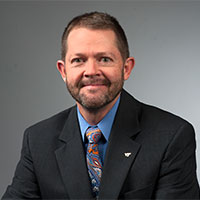
Tom Thompson
Associate Dean, College of Agriculture & Life Sciences
Director, CALS Global
Professor of Agronomy, Virginia Tech
Tom will discuss the background, goals, partnerships, and implementation plan for Virginia Tech’s “RIPE-Partnership” project, a new $80 million project funded by USDA’s Partnerships for Climate-Smart Commodities program.
Tom Thompson is Associate Dean in the College of Agriculture and Life Sciences (CALS) at Virginia Tech, Director of CALS Global, and Professor of Agronomy. Thompson earned BS, MS, and PhD degrees in agronomy and soil science and served as Professor and Extension Specialist at the University of Arizona and Professor and Department Head at both Texas Tech University and Virginia Tech before assuming his current position.
Thompson has published more than 65 refereed journal articles and garnered more than $87 million in extramural competitive funding and more than $11 million in philanthropic support. His expertise is in soil, water, and nutrient management in cropping systems and disturbed lands, and climate-smart agriculture.
In addition to his work in the U.S., he has conducted and published research from China, Haiti, Israel, Mexico, and Senegal. Thompson is also Executive Editor of the Global Agricultural Productivity Report (GAP Report). The annual GAP Report is a global thought leader in agricultural productivity growth and engages audiences around the world. Thompson is a Fellow of the American Society of Agronomy, the Soil Science Society of America, LEAD21, and the Food Systems Leadership Institute.
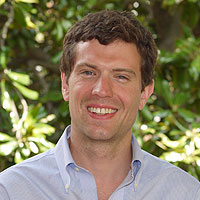
Andrés Clarens
Associate Director
Environmental Resilience Institute
Andrés Clarens is a Professor of Environmental Engineering at the University of Virginia and Associate Director of the University’s Environmental Resilience Institute. Their group studies decarbonization of infrastructure systems.
At large scales, their work explores the life cycle environmental impacts of the manufacturing, transportation, and energy sectors through projects in next-generation bioenergy, subsurface energy storage, and negative emissions technologies.
At the molecular scale, they study the chemistry of CO2 in high pressure environments to support geologic carbon storage and the production of carbon-negative cements. Their work is supported by a range of federal agencies including the National Science Foundation and the Department of Energy.
Andrés has been a visiting professor at Utrecht University (Netherlands) and the Technical University of Argentina. Before coming to UVA he was a US Peace Corps volunteer in the Dominican Republic.
Andrés received a B.S. in Chemical Engineering from the University of Virginia, and an M.S.E. and Ph.D. in Environmental Engineering from the University of Michigan. He has three great kids and loves backpacking, fly-fishing, and traveling with them.
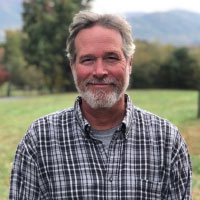
Brent Wills
President, Board of Directors
Virginia Association for Biological Farming
Brent Wills has been involved in restorative agricultural systems and conservation for 25 years and is the owner of Wills Soil & Stream in Montvale, Virginia, providing ecological land management services for farmers and land managers in the mid-Atlantic region.
Since 2004, Brent and his family have operated Bramble Hollow Farm in the mountains of Bedford County, Virginia, and use managed livestock rotations, composts and other soil-building techniques to diversify their pasture-based operation where they specialize in the production of heritage breeds of pigs and poultry, including farm-hatched heritage birds for laying flocks as well as meat birds.
Brent serves as President on the Board of Directors for the Virginia Association for Biological Farming, promoting soil health, resilient farming practices and the production of nutrient-dense and ecologically-friendly food.
Mitigating Climate Impacts on Virginia Farms
We are seeing a major shift in the agricultural paradigm, especially on small diversified family-owned farms all across the country. Soil health, nutrient-density in food crops and overall ecosystem benefits are being achieved by farmers and food producers who prioritize the biological systems they rely upon. The main goal of biological and organic farmers is to improve the plant-soil relationship by focusing on carbon cycling, managing rotations and biological diversity and how those components build health and resilience into our food production systems. We will discuss the what, why and how of several on-going programs in Virginia and the organizations that are helping to pave the way.
• S E S S I O N 4 •
Community Action: Creating Resilience Hubs for Community Safety
December 15 • 1:00–2:30 PM
Speakers

David L. Comis
Senior Energy Program Manager
Maryland Energy Administration
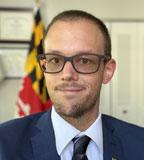
Brandon Bowser
Energy Resilience Program Manager
Maryland Energy Administration
David and Brandon’s presentation will focus on MEA’s commitment to and developments in promoting resilient energy system adoption across Maryland’s communities (especially those that disproportionately experience socioeconomic and environmental vulnerabilities and challenges), critical infrastructure, businesses, industries, higher learning institutions, and government facilities. They will focus on the development of the Resilient Maryland portfolio, what they learned, and how effective all programs within it have been.
David’s focus areas include solar energy, energy storage, nuclear energy, and grid resilience.
Prior to working at the Maryland Energy Administration (MEA), David helped the U.S. Department of Energy develop their first Strategic Sustainability Performance Plan and supported the Federal Energy Management Program in the areas of renewable energy and technology deployment.
David’s formal education includes a B.S. in Control Systems Engineering from the United States Naval Academy, an M.S. in Management from National-Louis University, and an M.S. in Energy Policy and Climate Change from Johns Hopkins University.
Brandon manages a suite of energy resilience-focused incentive programs that help Maryland organizations develop and install microgrids and other distributed energy resource (DER) systems.
Programs that Brandon manages include the Resilient Maryland planning program, Resilient Maryland Capital Development program, Combined Heat and Power (CHP) Grant Program, and Jane E. Lawton Conservation Loan Program. Brandon also works with the Policy Team on DER and Nonwires Alternatives (NWA) items. Additionally, he serves as MEA’s ESF-12 Emergency Management Coordinator during natural disasters and other events that threaten the integrity of the State’s power grid and fuel supplies.
Brandon previously worked for an energy consulting firm for commercial retail properties where he managed a team of energy analysts in utility redistribution and demand response. He has also served at MEA in a prior tenure, during which he managed several residential and commercial renewable and energy efficiency incentive programs. He holds a Master’s Degree in Finance and Bachelor’s Degree in Energy Business & Finance, both from Penn State University.
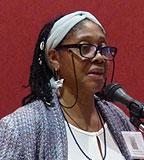
Queen Shabazz
CEO
Virginia Environmental Justice Collaborative
Queen Shabazz will discuss the Community Resiliency Hub that the Virginia Environmental Justice Collaborative is developing in Petersburg, VA. This solar resilience hub, located in the Heights area of Petersburg, will provide the surrounding community with heating and cooling in times of power outages, training for residents who are entering/returning to the workforce, and a space for a soup kitchen and food pantry.
Queen Zakia Shabazz is an author, educator, lecturer, and environmental justice advocate. Her work began in 1996 when she discovered that her young son had been poisoned by lead, prompting her to establish United Parents Against Lead (UPAL). UPAL is a national networking organization of and for parents of children poisoned by lead that works to end the threat of lead poisoning and other environmental hazards through education and awareness, advocacy, intervention, and resource referral.
In addition to serving as executive director of UPAL, Shabazz is a local Stand for Children Organizer, a position she’s held since 1996. She currently serves as Coordinator of the Virginia Environmental Justice Collaborative (VEJC) and is a member of the Lead Service Line Replacement Collaborative. Shabazz is an inaugural Community Partners in Residence Fellow at the University of Richmond, and a former elementary school teacher. As an advocate for Adult Literacy she has served as a READ Center Board member and on the advisory board of the Senate Joint Subcommittee Studying Lead Poisoning Prevention. Shabazz continues to provide valuable insight, time, and dedication towards the eradication of lead poisoning.
Queen Shabazz holds a bachelor’s in business administration and a paralegal certificate specializing in real estate and civil litigation. She is also a notary public and a 2019 graduate of the EPA’s Environmental Justice Academy.
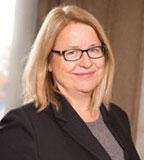
Andrea McGimsey
Executive Director
Faith Alliance for Climate Solutions (FACS)
Andrea will discuss FACS’ Solar Sanctuaries program that aims to make the concept of resilience hubs a reality on the ground in Virginia. Leveraging the power of faith communities, the program will install solar and battery backup systems on faith buildings, primarily in rural and low-income communities. These Solar Sanctuaries will save lives during a time of increasingly adverse climate events and public health risks.
Andrea is the executive director of the Faith Alliance for Climate Solutions. She is a committed environmental activist, advocate, and leader. She served on the Loudoun County Board of Supervisors from 2008 to 2011, where she led the county’s work on climate solutions. As Senior Director for Global Warming Solutions of Environment America, she led campaigns to reduce greenhouse gas emissions as quickly as possible economy-wide in the United States. She is a native of Northern Virginia.
